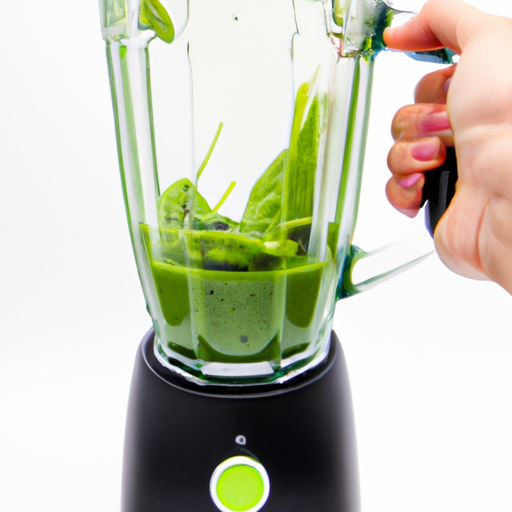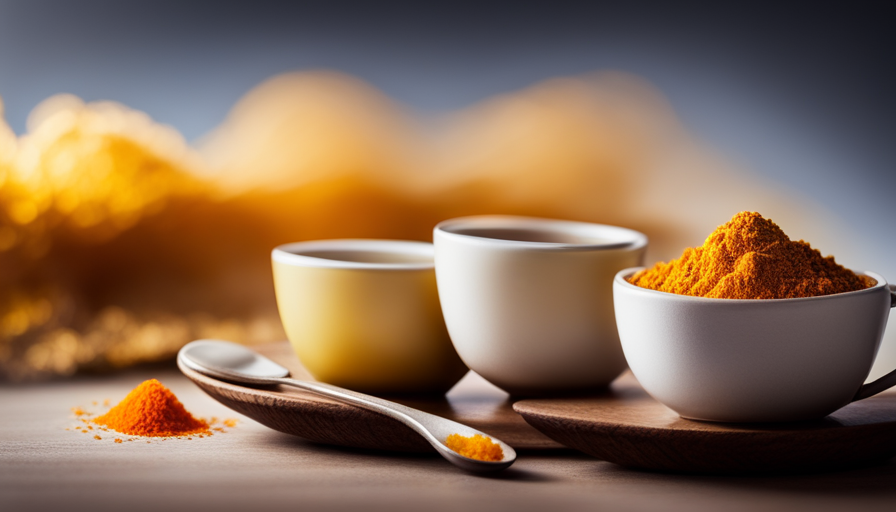Turmeric tea, an alluring beverage with a unique flavor profile, is captivating people globally. Its sweet and rich taste, coupled with a plethora of health advantages, presents it as an attractive choice for individuals looking to infuse their everyday life with some zest.
As someone who has recently discovered the wonders of turmeric tea, I am excited to share my findings on this herbal infusion. For centuries, turmeric has been used in traditional medicine practices for its anti-inflammatory and antioxidant properties.
But what makes turmeric tea stand out from other forms of consuming this golden spice? In this article, we will explore the science behind turmeric tea and its potential benefits and risks. So grab a cuppa as we delve into the world of turmeric tea!
Key Takeaways
- Turmeric tea contains curcumin, a compound with strong anti-inflammatory properties that can reduce inflammation in the body, ease menstrual cramps, and alleviate symptoms of digestive issues like bloating and indigestion.
- Regular consumption of turmeric tea may reduce the risk of chronic diseases like heart disease and cancer, improve immune function, and positively affect brain health by reducing the risk of neurodegenerative diseases like Alzheimer’s and Parkinson’s.
- Turmeric tea can be beneficial for skin health, helping to reduce acne, brighten complexion, and improve texture and hyperpigmentation, but it’s important to be cautious as some people may experience staining or allergic reactions.
- When incorporating turmeric tea into your routine, it’s important to choose a high-quality product without artificial flavors or additives and to be mindful of potential interactions with medications or medical conditions.
What is Turmeric Tea?
You might be wondering what turmeric tea is and why you should give it a try. Well, it’s a beverage made by brewing grated or powdered turmeric root in hot water. Turmeric root has been used for centuries in traditional Ayurvedic medicine to treat various ailments, including inflammation, digestive disorders, and skin problems.
Turmeric tea can be brewed using different techniques. For example, it can be boiled directly in the water or steeped in tea bags with other herbs and spices. The flavor of turmeric tea may vary depending on the brewing technique and additional ingredients used. Some people prefer adding honey or lemon juice to enhance its taste.
Now let’s explore the science behind turmeric tea without stepping away from our fact-based approach.
The Science Behind Turmeric Tea
By incorporating this flavorful spice into a hot beverage, individuals are able to experience the potential health benefits associated with turmeric.
One of the most notable benefits of turmeric tea is its ability to aid digestion. Turmeric contains curcumin, a compound that helps reduce inflammation in the digestive tract and may alleviate symptoms of bloating, gas, and indigestion.
Additionally, turmeric tea has been shown to be effective in easing menstrual cramps for women. The anti-inflammatory properties of curcumin may help reduce pain and discomfort during menstruation. While more research is needed on the topic, early studies suggest that consuming turmeric regularly may also have other health benefits such as reducing the risk of chronic diseases like heart disease and cancer.
The health benefits of turmeric tea extend beyond just aiding digestion and easing menstrual cramps.
Health Benefits of Turmeric Tea
I want to discuss the health benefits of turmeric tea, which include its anti-inflammatory and antioxidant properties. Turmeric tea has been shown to improve brain function and may help prevent certain diseases.
I’m excited to explore these key points in more detail and learn about how incorporating turmeric tea into my diet can positively impact my overall health.
Anti-inflammatory Properties
Turmeric tea is known for its anti-inflammatory properties, making it a great choice for those looking to reduce inflammation in their body. Here are 4 reasons why turmeric tea can be beneficial as an anti-inflammatory drink:
-
Curcumin, the active ingredient in turmeric, has been shown to have strong anti-inflammatory effects.
-
Turmeric tea recipes often include other ingredients with anti-inflammatory properties, such as ginger and cinnamon.
-
Studies have found that turmeric tea may help reduce pain and inflammation associated with conditions like arthritis and inflammatory bowel disease.
-
Turmeric tea for pain relief may also improve overall immune function, which can further contribute to reducing inflammation in the body.
In addition to its anti-inflammatory benefits, turmeric tea also has antioxidant properties that make it a great addition to a healthy diet.
Antioxidant Properties
With its high levels of antioxidants, sipping on a steaming cup of turmeric tea can provide you with as much antioxidant power as a serving of blueberries. Antioxidants are essential for our body’s health as they protect our cells from damage caused by free radicals. Turmeric contains various antioxidants such as curcuminoids, which have been found to be effective in reducing oxidative stress in the body.
Apart from using turmeric in cooking, it can also be consumed through supplements or drinks like tea. Turmeric supplements are becoming increasingly popular due to their potential health benefits. Studies have shown that curcuminoids may help improve heart health, reduce inflammation and pain in people with arthritis, and even prevent certain types of cancer.
With its uses beyond cooking and various health benefits, it’s no wonder why turmeric is gaining popularity worldwide. Turmeric’s antioxidant properties aren’t just good for preventing cell damage – they may also benefit brain function improvement.
Brain Function Improvement
As we’ve seen, turmeric tea is a great source of antioxidants that can help prevent cell damage and inflammation. But did you know that it can also improve brain function? Studies have shown that curcumin, the active ingredient in turmeric, can cross the blood-brain barrier and positively affect brain health.
Curcumin has been found to increase levels of a growth hormone called Brain-Derived Neurotrophic Factor (BDNF), which is responsible for the growth and survival of neurons in the brain. This leads to improved cognitive function, including better memory and attention span. Additionally, curcumin has been shown to reduce the risk of neurodegenerative diseases such as Alzheimer’s and Parkinson’s by protecting against oxidative stress and inflammation in the brain.
| Pros | Cons |
|---|---|
| Can improve cognitive function | May interact with certain medications |
| Reduces risk of neurodegenerative diseases | May cause gastrointestinal issues in high doses |
| Contains anti-inflammatory properties | Not enough research on long-term effects |
| Natural alternative to medication for brain health |
Incorporating turmeric tea into your daily routine could have significant benefits for your brain health. However, it’s important to be cautious if you’re taking any medications or have pre-existing digestive issues. As we move into our next section about disease prevention, it’s worth noting that maintaining a healthy brain through lifestyle choices like drinking turmeric tea may also contribute to overall disease prevention.
Disease Prevention
By making small lifestyle changes, such as incorporating natural remedies and regular exercise, we can work towards preventing diseases and maintaining overall health. Turmeric tea is one such natural remedy that has been shown to have disease-preventative properties.
Here are some prevention tips for using turmeric tea:
- Add black pepper to your turmeric tea: Black pepper contains piperine which helps the body absorb curcumin (the active ingredient in turmeric) better.
- Drink it regularly: Consistency is key when it comes to reaping the benefits of turmeric tea. Aim for at least a cup a day.
- Combine with healthy habits: While turmeric tea may help prevent diseases, it’s important to also maintain an overall healthy lifestyle by exercising regularly, eating well-balanced meals, and getting enough sleep.
Incorporating these prevention tips into our daily routine can go a long way in promoting our health and wellness. However, it’s important to be aware of potential risks and side effects of consuming too much turmeric or combining it with certain medications or medical conditions.
Potential Risks and Side Effects
Although turmeric tea has many potential health benefits, it’s important to be aware of possible risks and side effects. Turmeric contains a chemical called curcumin which can interact with certain medications such as blood thinners or anti-inflammatory drugs. It is also possible that some people may experience an allergic reaction to turmeric, causing symptoms such as hives or difficulty breathing.
As with any supplement or herbal remedy, it’s important to talk to your healthcare provider before adding turmeric tea to your routine. In addition to drug interactions and allergies, there are other precautions you should take when consuming turmeric tea. For example, excessive consumption of turmeric can cause stomach upset or diarrhea in some individuals. Pregnant women should also be cautious about consuming large amounts of turmeric as it may stimulate the uterus and potentially lead to complications during pregnancy.
Overall, while turmeric tea is generally safe for most people in moderate amounts, it’s important to take into consideration any potential risks or side effects before incorporating it into your daily routine. When considering the different forms of turmeric available on the market, it’s important to weigh the pros and cons of each option before making a decision on what works best for you.
Turmeric Tea vs. Other Forms of Turmeric
While it’s true that turmeric tea can have potential risks and side effects, it’s important to remember that these are generally rare occurrences. However, some people may prefer to take turmeric in other forms, such as supplements or adding the spice to their food. So how does turmeric tea compare to these other options?
To answer this question, let’s take a look at a comparison table of the benefits and drawbacks of turmeric tea versus other popular beverages and supplements:
| Turmeric Tea | Green Tea | Turmeric Supplements | |
|---|---|---|---|
| Benefits | Contains antioxidants and anti-inflammatory properties | May boost metabolism and aid weight loss | Concentrated dose of curcumin |
| Drawbacks | Bitter taste for some individuals; may not contain high enough levels of curcumin for therapeutic purposes | Some brands may contain caffeine; may not have as many health benefits as turmeric tea | Possible side effects such as nausea or upset stomach |
Overall, while there are benefits and drawbacks to all three options, each individual will need to decide which form works best for their needs. For those who enjoy drinking teas and want a warm beverage with potential health benefits, turmeric tea could be a great option. On the other hand, those looking for more concentrated doses of curcumin may prefer taking supplements.
So now that we’ve looked at how turmeric tea compares to other forms of turmeric consumption, let’s explore how you can make your own delicious cup at home.
How to Make Turmeric Tea
To make a delicious cup of turmeric tea at home, all you need are a few simple ingredients and a little bit of time. Here’s what you’ll need:
- Turmeric powder or fresh turmeric root
- Water
- Optional flavorings such as ginger, honey, or lemon
Start by bringing the water to a boil in a small saucepan. Add 1 teaspoon of turmeric powder or finely grated fresh turmeric root per cup of water and any desired flavorings. Reduce heat to low and let simmer for 10 minutes.
Strain the mixture through a fine-mesh sieve into your favorite mug and enjoy!
Turmeric tea comes in many variations, from golden milk to spiced chai blends, but they all offer similar benefits for digestion and immunity. Incorporating turmeric tea into your daily routine can be an easy way to add more anti-inflammatory compounds to your diet without sacrificing taste or convenience.
Incorporating Turmeric Tea into Your Diet
Adding turmeric tea to your daily routine is an easy and delicious way to boost your immunity and support digestion, leaving you feeling healthier and more energized.
There are a variety of turmeric tea recipes that you can try, from simple ones that require only turmeric powder, honey, lemon juice, and hot water to more complex blends that incorporate other spices like ginger or cinnamon.
You can also experiment with adding milk or coconut oil to your recipe for a creamier texture.
In terms of the best time to drink turmeric tea, it’s recommended that you have it in the morning or before meals. This will help jumpstart your digestive system and reduce inflammation throughout the day.
However, drinking it before bedtime may not be ideal as some people have reported difficulty sleeping due to its stimulating effects.
With these tips in mind, incorporating turmeric tea into your diet is a great way to improve your overall health and wellbeing.
As we move on to discussing how turmeric tea can aid in weight loss, let’s explore how this superfood can benefit our bodies even further.
Turmeric Tea and Weight Loss
If you’re looking for a natural way to boost your weight loss efforts, turmeric tea might be worth giving a try. Not only does it offer numerous health benefits, but studies have shown that turmeric can also help increase metabolism and regulate blood sugar levels.
When it comes to weight loss, metabolism is crucial. The higher your metabolism, the more calories your body burns at rest. Turmeric contains an active compound called curcumin, which has been found to help increase metabolism and promote fat burning in the body. Additionally, curcumin has been shown to help regulate blood sugar levels by improving insulin sensitivity. This can be especially beneficial for those struggling with type 2 diabetes or insulin resistance.
To add an emotional response in the audience, turmeric tea can provide improved energy levels, increased confidence and motivation, and a sense of accomplishment.
So if you’re looking for a natural way to enhance your weight loss journey, consider adding turmeric tea into your daily routine. Not only can it provide numerous health benefits but it may also offer some extra support when it comes to shedding unwanted pounds.
Now let’s move on to how turmeric tea can benefit our skin health.
Turmeric Tea and Skin Health
I’m excited to delve into the benefits of turmeric tea for skin health.
Turmeric has anti-aging and anti-inflammatory properties that make it a popular ingredient in DIY skincare recipes.
Before experimenting with these recipes, it’s important to recap the benefits and risks of using turmeric on your skin, as well as considering personal factors and consulting with a healthcare professional.
Anti-aging and Anti-inflammatory Properties
Turmeric tea is renowned for its ability to combat aging and inflammation, making it a powerful addition to any wellness routine. Its anti-aging properties are due to the presence of curcumin, a compound found in turmeric that has been shown to have antioxidant effects on the body. This means that it can protect against free radicals that damage cells and contribute to aging.
In addition, turmeric tea’s anti-inflammatory properties can also help with longevity by reducing chronic inflammation in the body. Chronic inflammation has been linked to various diseases such as heart disease, Alzheimer’s disease, and cancer. By incorporating turmeric tea into your daily routine, you may be able to lower your risk of developing these conditions and improve your overall health. Check out the table below for more information on the benefits of turmeric tea for beauty and longevity:
| Benefits of Turmeric Tea |
|---|
| Reduces wrinkles and fine lines |
| Fights acne and other skin conditions |
| Boosts immune system |
As you can see from this table, there are many benefits associated with drinking turmeric tea regularly. Not only does it help with anti-aging and inflammation, but it can also improve skin health and boost immunity. If you’re interested in incorporating more natural remedies into your skincare routine, stay tuned for our section on DIY skincare recipes.
DIY Skincare Recipes
Let’s explore some easy and fun DIY skincare recipes that can help you achieve a glowing, healthy complexion. As someone who values natural ingredients and a holistic approach to skincare, I’ve found that making my own products is both fulfilling and effective.
Not only does it allow me to customize my routine according to my skin’s needs, but it also promotes sustainable living by reducing waste and unnecessary packaging.
One of my favorite DIY skincare recipes is a simple face mask made with turmeric powder, honey, and yogurt. Turmeric has anti-inflammatory properties that can help reduce redness and irritation while brightening the skin. Honey is naturally antibacterial and moisturizing, making it perfect for acne-prone or dry skin types. Yogurt contains lactic acid, which gently exfoliates the skin for a smoother texture.
Mixing these three ingredients together creates a nourishing mask that leaves my skin feeling soft, hydrated, and glowing. Incorporating this DIY skincare routine into your weekly self-care can lead to long-lasting benefits for your skin without exposing yourself to harsh chemicals or expensive products.
Moving on to the next section about the ‘recap of benefits and risks,’ it’s important to note that even though natural ingredients may be safer than synthetic ones in general, there are still potential risks associated with certain ingredients when used improperly or in high concentrations.
It’s always recommended to do thorough research before trying any new ingredient or recipe on your skin and patch test first if you have sensitive skin. With that said, incorporating DIY skincare recipes into your routine can be an empowering way to take control of your beauty regimen while promoting sustainable living practices.
Recap of Benefits and Risks
Incorporating natural ingredients in DIY skincare recipes can bring remarkable benefits to your skin, but it’s crucial to be aware of potential risks and do thorough research before trying out any new recipe. A small mistake could cause a catastrophe.
Turmeric is known for its anti-inflammatory and antioxidant properties, which can help reduce acne, brighten complexion, and soothe dry skin. However, there are also pros and cons to using turmeric tea on the skin.
Effectiveness-wise, turmeric tea has been shown to improve skin texture and reduce hyperpigmentation when used regularly. It contains curcumin, a powerful antioxidant that may protect against UV damage and premature aging. On the other hand, some people may experience drawbacks such as staining or allergic reactions when applying turmeric topically.
Additionally, it’s important to note that not all turmeric teas are created equal. Some may contain artificial flavors or additives that could worsen skin conditions. Thus, it’s essential to do your own research before incorporating any new ingredient into your skincare routine.
When considering using natural ingredients like turmeric in DIY skincare recipes or remedies, it’s essential to take personal considerations into account and consult with a healthcare professional if necessary. While some ingredients have shown promising results for certain skin concerns, everyone’s skin is unique and may react differently. A healthcare professional can provide guidance on how best to incorporate these ingredients safely into your routine while avoiding potential risks or side effects.
Personal Considerations and Consultation with a Healthcare Professional
Before trying out any new DIY skincare recipe with natural ingredients, it’s important to consider personal factors and consult with a healthcare professional to ensure safe and effective use for your unique skin type.
While turmeric tea has numerous potential benefits for the skin, including anti-inflammatory and antioxidant properties, it may not be suitable for everyone. For example, individuals with sensitive skin or allergies to turmeric should exercise caution when using this ingredient.
Additionally, consulting with a healthcare professional can help identify any potential interactions with medications or medical conditions that could cause harm. It’s always best to err on the side of caution and seek advice from a qualified medical expert before incorporating any new ingredient into your skincare routine.
Taking these steps can help ensure that you reap the maximum benefits of turmeric tea without risking any adverse reactions or complications.
Frequently Asked Questions
What are the different types of turmeric tea?
There are countless types of turmeric tea, each with unique health benefits. From spicy chai blends to sweet honey concoctions, the flavor profiles are endless. Experiment with different recipes and find your perfect cup!
Can turmeric tea be used for treating specific medical conditions?
Turmeric tea benefits include reducing inflammation and improving digestion, but it may have side effects such as blood thinning and gastrointestinal issues. It is not a substitute for medical treatment of specific conditions.
How much turmeric tea should be consumed daily to yield health benefits?
According to research, consuming 500-2000mg of curcumin (the active ingredient in turmeric) daily can yield health benefits such as reducing inflammation and improving brain function. Turmeric tea dosage may vary depending on concentration. Turmeric tea benefits are numerous when consumed within recommended limits.
Is it safe to consume turmeric tea while pregnant or breastfeeding?
As a healthcare professional, I advise caution when consuming turmeric tea during pregnancy or breastfeeding due to potential risks. While it has health benefits, there are safer herbal teas available. Always consult with your doctor before taking any supplements.
Is turmeric tea safe for individuals with certain medical conditions, such as liver disease or gastrointestinal issues?
For those with liver disease or digestive issues, it’s important to consult a healthcare professional before consuming turmeric tea. Turmeric can affect liver function and may worsen symptoms of gastrointestinal conditions.
Conclusion
In conclusion, after researching and experimenting with turmeric tea myself, I can confidently say that it’s a great addition to any diet. Its numerous health benefits make it worth trying out, from reducing inflammation to potentially aiding in weight loss.
However, as with anything, it’s important to be cautious of potential risks or side effects and consult with a healthcare professional before incorporating it into your routine.
At the end of the day, turmeric tea is just one piece of the puzzle when it comes to living a healthy lifestyle. It shouldn’t be relied on as a miracle cure-all but rather used in conjunction with other healthy habits such as exercise and a balanced diet.
As the saying goes, "Rome wasn’t built in a day,"and neither is optimal health achieved overnight. But by consistently making small changes like incorporating turmeric tea into our diets, we can work towards improving our overall well-being over time.










